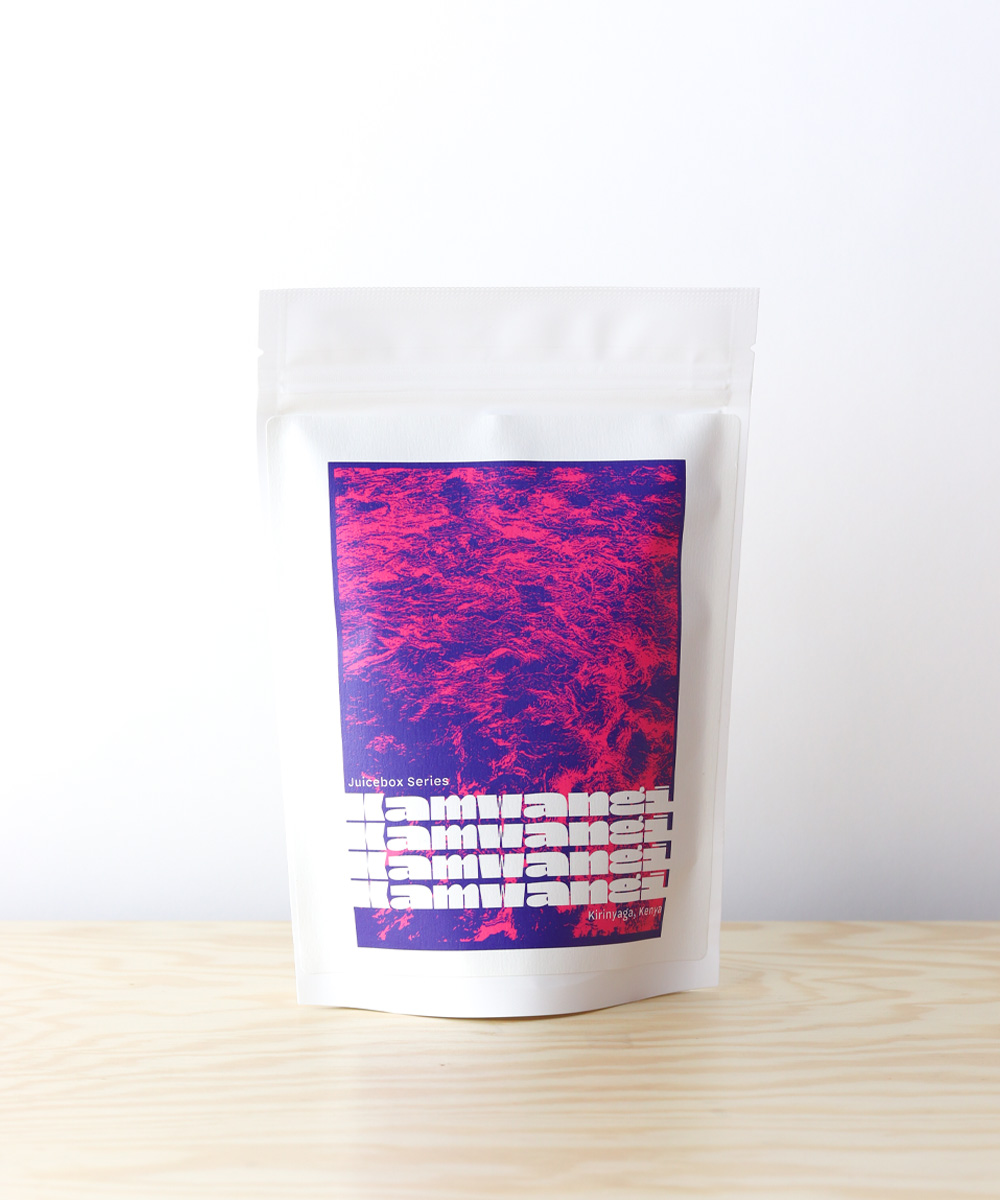Juicebox Series (2023) ~ Kamwangi AA from Kirinyaga, Kenya
US$0.00
Producers: smallholders organized around Kamwangi washing station
Where: Kirinyaga, Kenya
Varieties: SL28, Ruiru 11, Batian
Processing: Washed
Importer: Red Fox
Harvest: Dec-Jan 2022/23
Tasting notes: phosphoric, mango, tree tomato
With resinous mango sweetness, tomato leaf and forest berry, this complex first Juicebox Series lot for 2023 is comprised of SL28, Ruiru 11, and Batian varieties, grown and processed by folks organized around the Kamwangi washing station in Kirinyaga.
This most recent harvest was rife with challenges relating to weather and yields for all of Kenya, it’s evident that this producer crew can roll with it and produce something truly beautiful.
Producers
Kamwangi is a part of the New Ngariama Farmer’s Cooperative Society (FCS), which operates three mills in Kirinyaga, Kenya. New Ngariama FCS has 1800 members who grow coffee in their gardens (less than 0.5 hectare per producer), and can deliver ripe cherry to any of the three factories (washing stations).
After coffee cherry is harvested it is brought to the factory and then weighed. Smallholder farmers collect their earnings at that time. Coffee cherry is then sent through a disk depupler removing most of the fruit, fermented for 24-hours then washed again making the entire process 72-hours. Time in which parchment coffee dries heavily depends on the climate, ambient temperature, and volume being processed which could take up to 15 days and as little as one week. With newly installed solar dryers (technology borrowed from what is now commonplace in Central America), however, the timing is much more controlled and it really shows in the health of the green coffee in a year where the rest of the coffee industry in Kenya is struggling with an uncooperative climate reality.
Varieties
A field blend of SL28, Ruiru 11, and Batian as the coffee is made up of cherry grown by many members of the New Ngariama FCS, who could be growing any of these 3 varieties.
SL28 is among the most well-known and well-regarded varieties of Africa and of course, Kenya. Originally selected at the former Scott Agricultural Laboratories (now the National Agricultural Laboratories, in Kiambu County, Kenya). Individual tree selections made at the Scott Laboratories during the 1935-1939 period were prefixed SL for Scott Labs. Fourty-two trees of various origins were selected and studied for yield, quality, drought and disease resistance. One of the selections came from a single tree in a cluster of coffees growing in what is now Tanzania. This was a variety of Bourbon that has ties to Brazil, before being brought to Tanzania and selected for breeding in 1931. According to historical documents, the senior coffee officer of Scott Labs noticed a variety growing in the Moduli district (Arusha, Tanzania) that appeared to be tolerant to drought, diseases and pests. Seed was collected and brought back to Scott Laboratories, where its drought resistance was confirmed. It was widely distributed and became known as SL28 – now one of specialty coffee’s most beloved varieties for its excellent cup quality.
Ruiru 11 was created out of panic around a coffee berry disease epidemic in 1968 that led to the loss of half of Kenya’s production that year. The following decade was the focus of an intensive breeding program to cultivate something disease tolerant, which led to the stocky compact Ruiru 11, which is an Fl hybrid. Since this one relies on hand pollination, it’s not easy to meet the demand for seedstock.
Batian, the new kid on the block, was first cultivated in 2010-11 is tall with pretty huge beans and is a composite variety, meaning it is comprised of many varieties in its lineage, making it a sort of super hybrid. With SL28, SL34, Rume Sudan, N39, K7, SL4 and Timor Hybrid – This one’s known to be tasty and higher yielding.
Processing
Only the ripest cherries are delivered, and additional hand sorting and floating is done to remove less dense and damaged fruit before the coffee is depulped, fermented, and washed.
After the coffee is washed, it’s soaked in fresh water for long periods – This process is often called Double Washed or Kenya process, and contributes to the quality through equalizing the seeds moisture before going to the drying tables.
The lot is dried for up to two weeks on raised beds, which are carefully constructed to ensure proper air circulation and temperature control for optimal drying, contained within the newly installed solar dryer system described above. When the coffee is milled for export, the green beans are sorted by screen size and graded according to size and shape. Larger beans (17/18 screen) are labelled AA (like this one from Kamwangi), 15/16 screen are labelled AB, and the round peaberry are labelled PB, there are also other grades that you don’t often see exported.
Water
We brew all our coffees with municipal water that flows from our taps in Metro Vancouver. This municipal source is very soft, low ppm water (around 30 TDS)
There are many alternative water recipes out there that will produce tasty cups if your water from the tap isn’t giving you good results. A good place to start is 1/2 strength Third Wave Water of around 60-70ppm (0.16g.-0.2g./L of TWW powder).
Brewing
We make an effort to taste our coffees in a variety of ways, but mostly use cupping, V60, and Kalita 155 brews as our main ways of quality control and dialling in roast profiles. Our filter recipes can be found in our Journal here:
Espresso
Roasted with filter coffee in mind, expect shots that are lighter in body and brighter in acidity than your typical espresso profile.
Kamwangi AA makes shots that are bright with flavours of mango, forest berry and tree tomato along with a nice brown sugar finish to round it all out. Best as straight espresso and filter coffee.
Starting spec: 18g:45g in 25 sec. on 9bar profile @93C
